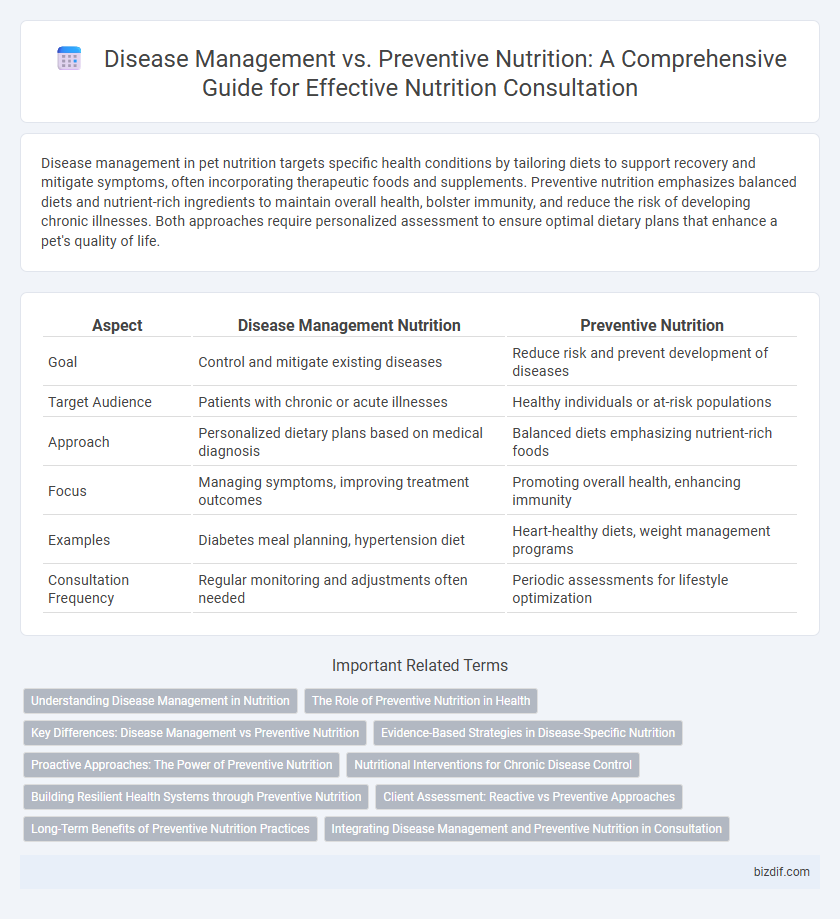Disease management in pet nutrition targets specific health conditions by tailoring diets to support recovery and mitigate symptoms, often incorporating therapeutic foods and supplements. Preventive nutrition emphasizes balanced diets and nutrient-rich ingredients to maintain overall health, bolster immunity, and reduce the risk of developing chronic illnesses. Both approaches require personalized assessment to ensure optimal dietary plans that enhance a pet's quality of life.
Table of Comparison
| Aspect | Disease Management Nutrition | Preventive Nutrition |
|---|---|---|
| Goal | Control and mitigate existing diseases | Reduce risk and prevent development of diseases |
| Target Audience | Patients with chronic or acute illnesses | Healthy individuals or at-risk populations |
| Approach | Personalized dietary plans based on medical diagnosis | Balanced diets emphasizing nutrient-rich foods |
| Focus | Managing symptoms, improving treatment outcomes | Promoting overall health, enhancing immunity |
| Examples | Diabetes meal planning, hypertension diet | Heart-healthy diets, weight management programs |
| Consultation Frequency | Regular monitoring and adjustments often needed | Periodic assessments for lifestyle optimization |
Understanding Disease Management in Nutrition
Disease management in nutrition involves tailoring dietary strategies to support treatment and improve outcomes for individuals with chronic conditions such as diabetes, cardiovascular disease, or renal disorders. It emphasizes nutrient regulation, symptom control, and metabolic stabilization to prevent complications and enhance quality of life. Nutrition consultation for disease management requires precise assessment of medical history, laboratory data, and individualized nutrition plans to align with therapeutic goals.
The Role of Preventive Nutrition in Health
Preventive nutrition plays a crucial role in reducing the risk of chronic diseases by promoting balanced diets rich in fruits, vegetables, whole grains, and lean proteins. Emphasizing nutrient-dense foods supports immune function, regulates metabolism, and helps maintain optimal body weight, thereby preventing conditions such as diabetes, cardiovascular disease, and obesity. Early dietary interventions through preventive nutrition strategies enhance long-term health outcomes and reduce healthcare costs associated with disease management.
Key Differences: Disease Management vs Preventive Nutrition
Disease management nutrition targets individuals with existing conditions such as diabetes or cardiovascular disease, aiming to control symptoms and prevent complications through tailored dietary plans. Preventive nutrition focuses on optimizing nutrient intake and lifestyle habits to reduce the risk of chronic diseases before they develop. Key differences include the reactive approach of disease management versus the proactive strategy of preventive nutrition, emphasizing maintenance of health rather than treatment.
Evidence-Based Strategies in Disease-Specific Nutrition
Evidence-based strategies in disease-specific nutrition emphasize tailored dietary interventions to manage chronic conditions such as diabetes, cardiovascular diseases, and cancer, based on rigorous clinical research and guidelines. Disease management nutrition focuses on controlling symptoms and improving quality of life through nutrient regulation, while preventive nutrition aims to reduce disease risk by promoting balanced diets rich in antioxidants, fiber, and essential vitamins. Integrating personalized nutrition plans with ongoing monitoring enhances treatment efficacy and supports long-term health outcomes.
Proactive Approaches: The Power of Preventive Nutrition
Preventive nutrition emphasizes the proactive role of diet in reducing the risk of chronic diseases such as diabetes, cardiovascular conditions, and obesity by promoting nutrient-rich, balanced eating habits. Tailored interventions focusing on vitamins, minerals, antioxidants, and fiber intake support immune function and metabolic health, preventing disease onset before symptoms arise. Integrating preventive nutrition into routine healthcare reduces healthcare costs and improves patient outcomes compared to reactive disease management strategies.
Nutritional Interventions for Chronic Disease Control
Nutritional interventions for chronic disease control emphasize tailored dietary strategies that address specific metabolic imbalances and inflammatory pathways associated with conditions like diabetes, cardiovascular disease, and hypertension. Disease management nutrition prioritizes evidence-based modifications such as low glycemic index foods, omega-3 fatty acids, and sodium restriction to improve clinical outcomes and reduce symptom severity. Preventive nutrition focuses on maintaining optimal nutrient intake and balanced diets rich in antioxidants, fiber, and essential vitamins to reduce risk factors and delay disease onset.
Building Resilient Health Systems through Preventive Nutrition
Preventive nutrition plays a crucial role in building resilient health systems by reducing the incidence of chronic diseases such as diabetes, hypertension, and cardiovascular disorders through targeted dietary interventions. Disease management nutrition focuses on mitigating symptoms and complications after diagnosis, whereas preventive nutrition emphasizes nutrient-rich diets, early screening, and lifestyle modifications to forestall disease onset. Integrating evidence-based preventive nutrition strategies into public health policies enhances population health outcomes and alleviates long-term healthcare costs.
Client Assessment: Reactive vs Preventive Approaches
Client assessment in disease management primarily involves reactive approaches centered on identifying existing health issues and tailoring nutritional interventions to manage symptoms and prevent complications. Preventive nutrition focuses on proactive evaluation of dietary habits, lifestyle factors, and risk indicators to design personalized plans that reduce the likelihood of chronic diseases such as diabetes, hypertension, and cardiovascular disorders. Utilizing tools like biometric screenings, dietary recalls, and risk stratification enables nutritionists to shift from reactive care to proactive wellness strategies.
Long-Term Benefits of Preventive Nutrition Practices
Preventive nutrition practices significantly reduce the risk of chronic diseases such as diabetes, cardiovascular conditions, and obesity through balanced diets rich in fruits, vegetables, whole grains, and lean proteins. Early intervention with nutrient-dense foods supports optimal immune function, metabolic health, and weight management, leading to sustained well-being over time. Incorporating preventive nutrition into daily habits fosters resilience against illness and decreases healthcare costs by minimizing the need for intensive disease management.
Integrating Disease Management and Preventive Nutrition in Consultation
Integrating disease management and preventive nutrition in consultation enhances patient outcomes by addressing both existing conditions and risk factors through personalized dietary strategies. Tailoring nutrition plans to manage chronic diseases such as diabetes or hypertension while promoting nutrient-rich foods helps prevent disease progression and supports overall health. Collaborating with multidisciplinary teams ensures evidence-based interventions that balance therapeutic goals and long-term wellness.
Disease Management vs Preventive Nutrition Infographic

 bizdif.com
bizdif.com